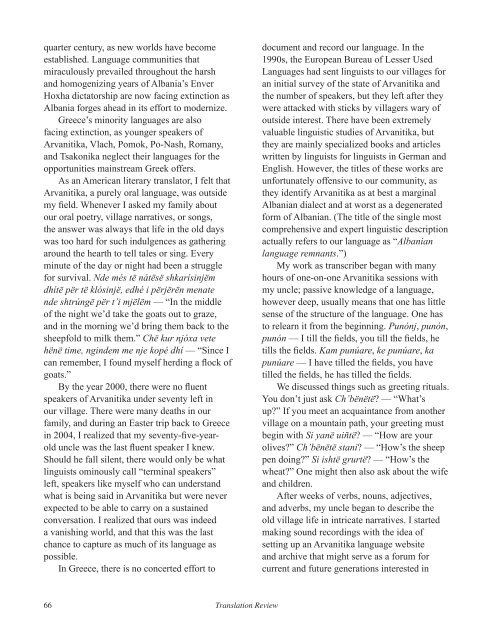Table of contents - The University of Texas at Dallas
Table of contents - The University of Texas at Dallas
Table of contents - The University of Texas at Dallas
Create successful ePaper yourself
Turn your PDF publications into a flip-book with our unique Google optimized e-Paper software.
quarter century, as new worlds have become<br />
established. Language communities th<strong>at</strong><br />
miraculously prevailed throughout the harsh<br />
and homogenizing years <strong>of</strong> Albania’s Enver<br />
Hoxha dict<strong>at</strong>orship are now facing extinction as<br />
Albania forges ahead in its effort to modernize.<br />
Greece’s minority languages are also<br />
facing extinction, as younger speakers <strong>of</strong><br />
Arvanitika, Vlach, Pomok, Po-Nash, Romany,<br />
and Tsakonika neglect their languages for the<br />
opportunities mainstream Greek <strong>of</strong>fers.<br />
As an American literary transl<strong>at</strong>or, I felt th<strong>at</strong><br />
Arvanitika, a purely oral language, was outside<br />
my field. Whenever I asked my family about<br />
our oral poetry, village narr<strong>at</strong>ives, or songs,<br />
the answer was always th<strong>at</strong> life in the old days<br />
was too hard for such indulgences as g<strong>at</strong>hering<br />
around the hearth to tell tales or sing. Every<br />
minute <strong>of</strong> the day or night had been a struggle<br />
for survival. Nde més të nátësë shkarísinjëm<br />
dhítë për të klósinjë, edhé i përjërën men<strong>at</strong>e<br />
nde shtrúngë për t’i mjëlëm — “In the middle<br />
<strong>of</strong> the night we’d take the go<strong>at</strong>s out to graze,<br />
and in the morning we’d bring them back to the<br />
sheepfold to milk them.” Chë kur njóxa vete<br />
hënë time, ngindem me nje kopé dhí — “Since I<br />
can remember, I found myself herding a flock <strong>of</strong><br />
go<strong>at</strong>s.”<br />
By the year 2000, there were no fluent<br />
speakers <strong>of</strong> Arvanitika under seventy left in<br />
our village. <strong>The</strong>re were many de<strong>at</strong>hs in our<br />
family, and during an Easter trip back to Greece<br />
in 2004, I realized th<strong>at</strong> my seventy-five-yearold<br />
uncle was the last fluent speaker I knew.<br />
Should he fall silent, there would only be wh<strong>at</strong><br />
linguists ominously call “terminal speakers”<br />
left, speakers like myself who can understand<br />
wh<strong>at</strong> is being said in Arvanitika but were never<br />
expected to be able to carry on a sustained<br />
convers<strong>at</strong>ion. I realized th<strong>at</strong> ours was indeed<br />
a vanishing world, and th<strong>at</strong> this was the last<br />
chance to capture as much <strong>of</strong> its language as<br />
possible.<br />
In Greece, there is no concerted effort to<br />
document and record our language. In the<br />
1990s, the European Bureau <strong>of</strong> Lesser Used<br />
Languages had sent linguists to our villages for<br />
an initial survey <strong>of</strong> the st<strong>at</strong>e <strong>of</strong> Arvanitika and<br />
the number <strong>of</strong> speakers, but they left after they<br />
were <strong>at</strong>tacked with sticks by villagers wary <strong>of</strong><br />
outside interest. <strong>The</strong>re have been extremely<br />
valuable linguistic studies <strong>of</strong> Arvanitika, but<br />
they are mainly specialized books and articles<br />
written by linguists for linguists in German and<br />
English. However, the titles <strong>of</strong> these works are<br />
unfortun<strong>at</strong>ely <strong>of</strong>fensive to our community, as<br />
they identify Arvanitika as <strong>at</strong> best a marginal<br />
Albanian dialect and <strong>at</strong> worst as a degener<strong>at</strong>ed<br />
form <strong>of</strong> Albanian. (<strong>The</strong> title <strong>of</strong> the single most<br />
comprehensive and expert linguistic description<br />
actually refers to our language as “Albanian<br />
language remnants.”)<br />
My work as transcriber began with many<br />
hours <strong>of</strong> one-on-one Arvanitika sessions with<br />
my uncle; passive knowledge <strong>of</strong> a language,<br />
however deep, usually means th<strong>at</strong> one has little<br />
sense <strong>of</strong> the structure <strong>of</strong> the language. One has<br />
to relearn it from the beginning. Punónj, punón,<br />
punón — I till the fields, you till the fields, he<br />
tills the fields. Kam punúare, ke punúare, ka<br />
punúare — I have tilled the fields, you have<br />
tilled the fields, he has tilled the fields.<br />
We discussed things such as greeting rituals.<br />
You don’t just ask Ch’bënëtë — “Wh<strong>at</strong>’s<br />
up” If you meet an acquaintance from another<br />
village on a mountain p<strong>at</strong>h, your greeting must<br />
begin with Si yanë uiñtë — “How are your<br />
olives” Ch’bënëtë stani — “How’s the sheep<br />
pen doing” Si ishtë grurtë — “How’s the<br />
whe<strong>at</strong>” One might then also ask about the wife<br />
and children.<br />
After weeks <strong>of</strong> verbs, nouns, adjectives,<br />
and adverbs, my uncle began to describe the<br />
old village life in intric<strong>at</strong>e narr<strong>at</strong>ives. I started<br />
making sound recordings with the idea <strong>of</strong><br />
setting up an Arvanitika language website<br />
and archive th<strong>at</strong> might serve as a forum for<br />
current and future gener<strong>at</strong>ions interested in<br />
66 Transl<strong>at</strong>ion Review

















